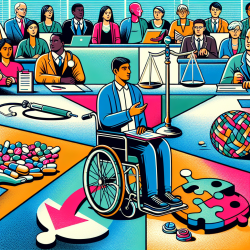Bridging the Gap: Rehabilitating Care for Disabilities and Chronic Illnesses
In the ever-evolving landscape of healthcare, the integration of services for people with disabilities and chronic illnesses is a pressing need. The research article "Just regionalisation: rehabilitating care for people with disabilities and chronic illnesses" provides a profound insight into how regionalisation can be leveraged to enhance care delivery. This blog explores key takeaways from the research and offers actionable steps for practitioners to improve their skills and advocate for better care systems.
Understanding Regionalisation
Regionalisation involves organizing health services at a local level to improve accessibility and efficiency. The study uses Ontario's implementation of Local Health Integration Networks (LHINs) as a case study to explore the ethical implications and opportunities for better care integration.
Key Principles for Effective Care
The research identifies several guiding principles that are crucial for developing a regionalised healthcare strategy:
- Equitable Access: Services should be based on patient need, ensuring that everyone has access to necessary care.
- Patient Choice: Patients should have the freedom to choose their care options, which requires a variety of available services.
- Responsiveness: Health services must be tailored to the specific needs of local populations.
- Shared Accountability: There should be a collaborative effort among providers, government, and the community to ensure quality care.
- Patient-Centered Care: The healthcare system should respect and incorporate patient perspectives in care planning.
Critical Success Factors
For practitioners, understanding these principles is just the beginning. The research outlines critical success factors that can guide the implementation of these principles:
- Building Alliances: Strong collaborations across ministries are essential for integrated planning and funding.
- Identifying Needs: Recognizing the specific needs of new populations, such as those with complex chronic conditions, is vital.
- Training Providers: Developing a skilled workforce through interdisciplinary training is necessary to meet diverse patient needs.
Action Steps for Practitioners
As a practitioner, you can take several steps to implement these insights:
- Engage in continuous learning to stay informed about regionalisation strategies and their ethical implications.
- Advocate for patient-centered care models that prioritize the needs and choices of individuals with disabilities and chronic illnesses.
- Collaborate with other professionals to develop integrated care plans that address both medical and social needs.
By embracing these strategies, practitioners can play a pivotal role in transforming healthcare systems to be more inclusive and effective for all patients.
To read the original research paper, please follow this link: Just regionalisation: rehabilitating care for people with disabilities and chronic illnesses.










